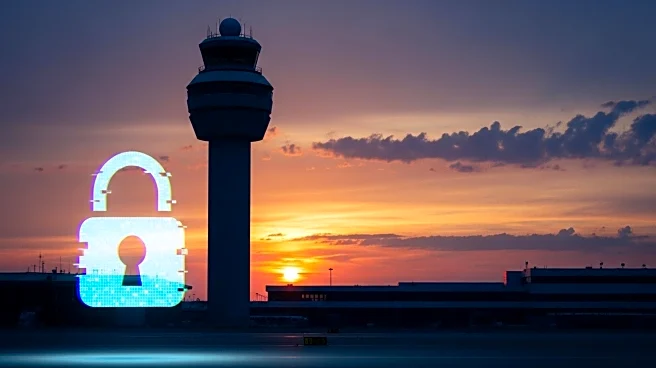What's Happening?
Collins Aerospace, a U.S.-based aviation technology company, experienced a ransomware attack that has led to significant disruptions at several major European airports. The attack, which began on Friday evening, involved hackers encrypting data on the company's servers and demanding a ransom. As a result, airlines have been forced to switch to manual check-in procedures, causing flight cancellations and delays. Airports affected include London Heathrow, Berlin Brandenburg, and Brussels Airport, with passengers facing long queues and extended waiting times. The cyberattack has severely impacted airport operations, with Brussels Airport cancelling 44 departing flights on Sunday despite requests to ground half of all outbound passenger flights.
Why It's Important?
The cyberattack on Collins Aerospace highlights the vulnerability of critical infrastructure to digital threats, emphasizing the need for robust cybersecurity measures in the aviation industry. The disruptions have affected thousands of passengers, causing economic losses for airlines and airports due to flight cancellations and delays. This incident underscores the potential for cyberattacks to cause widespread operational chaos, impacting international travel and commerce. It also raises concerns about the security of aviation technology systems and the importance of safeguarding them against future attacks.
What's Next?
Airports and airlines are likely to continue manual check-in procedures until Collins Aerospace resolves the ransomware issue. This may lead to prolonged disruptions and further economic impacts. Authorities and cybersecurity experts may investigate the attack to prevent similar incidents in the future. Airlines and airports might enhance their cybersecurity protocols to protect against such threats, potentially leading to increased investment in digital security measures.
Beyond the Headlines
The attack on Collins Aerospace could prompt broader discussions on the ethical implications of ransomware attacks and the responsibilities of companies in protecting sensitive data. It may also lead to increased collaboration between governments and private sectors to develop comprehensive cybersecurity strategies for critical infrastructure.








